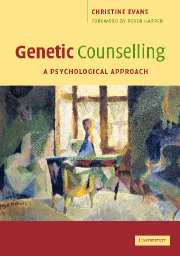Book contents
- Frontmatter
- Contents
- Acknowledgements
- Foreword
- Preface
- 1 An overview of genetic counselling
- 2 The psychological processes underlying genetic counselling
- 3 Understanding individual difference in genetic counselling using attachment theory
- 4 The role and skills of the counsellor and ideas from psychotherapy
- 5 Examples of the role and skills of the counsellor
- 6 The gene and the family system
- 7 Working with parents and children
- 8 The influence of the nature of the disorder on the consultation
- 9 The effect on the counsellor
- 10 The interview and non-directiveness
- References
- Index
10 - The interview and non-directiveness
Published online by Cambridge University Press: 12 August 2009
- Frontmatter
- Contents
- Acknowledgements
- Foreword
- Preface
- 1 An overview of genetic counselling
- 2 The psychological processes underlying genetic counselling
- 3 Understanding individual difference in genetic counselling using attachment theory
- 4 The role and skills of the counsellor and ideas from psychotherapy
- 5 Examples of the role and skills of the counsellor
- 6 The gene and the family system
- 7 Working with parents and children
- 8 The influence of the nature of the disorder on the consultation
- 9 The effect on the counsellor
- 10 The interview and non-directiveness
- References
- Index
Summary
Debating the possibility of non-directiveness
The earlier chapters have presented a theoretical underpinning for genetic counselling (stress), a framework for understanding differences in individual behaviour (attachment theory) and various micro-skills (empathy, etc.) to furnish the counsellor with an appropriate repertoire. This final chapter returns to looking at the overall picture, using a wide-angled lens to explore ‘the culture’ of genetic counselling. The terms genetic counselling and non-directiveness have become synonymous and seem to be intertwined in spite of the efforts of a number of authors to disentangle them and clarify meanings. Clarke (1991) has debated the possibility of achieving non-directiveness and further, whether it is desirable. Wolff and Jung (1995) consider that the demarcation from eugenics, the training of counsellors specifically for genetics and the infiltration of psychological counselling concepts have contributed to the idea of respect for patient autonomy in genetic counselling. They propose the term non-directive be dropped and that a more psychotherapeutic approach of exploring meaning and personal significance is more appropriate. Expressing a similar sentiment Weil (2003) considers that the term non-directive is a historic relic and an impediment to creative theory and practice. He proposes that the relevant components of balanced information without the counsellor imposing values be retained and that the central ethos should be to bring the psychosocial into every aspect of the work. In addition, there may be a difference in the counsellor's and patient's perception of the neutrality of the counsellor (Shiloh and Saxe, 1989).
- Type
- Chapter
- Information
- Genetic CounsellingA Psychological Approach, pp. 175 - 186Publisher: Cambridge University PressPrint publication year: 2006

